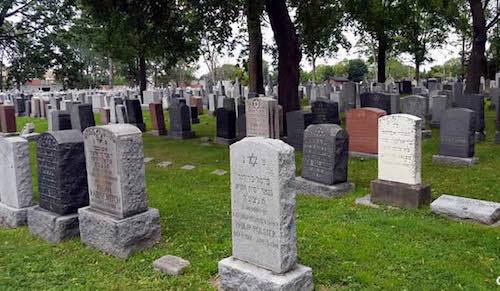
Question:
I'm in the process of making arrangements for my final resting place. In my family, some of my relatives have opted for a traditional Jewish burial, while others have chosen cremation. While researching my options, I've discovered that the Jewish religion does not believe in cremation and that Jews can't cremate. Would you please explain to me the origins and reasons why cremation is forbidden?
Reply
Before I respond to your question regarding the background of the Jewish prohibition against cremation, allow me to make some prefatory remarks:
In order to help clarify some of the issues, I am choosing to explain the topic "as is," i.e., as they appear in the "Big Books." Commenting on the particulars of one's experience may need additional questions clarified and is often best done in person with a rabbi more familiar with the particular person or family.
Commenting on the particulars of one's experience may need additional questions clarifiedThus, if anything that I will write will come across as insensitive, I beg your forgiveness in advance. That is clearly not my intention.
The laws I will attempt to present here are a distillation of rabbinic writings over the years. In terms of some of the deeper reflection on the human body and its role that I hope to provide — that is distilled from deep Chabad discourses, though I can hardly assert that my distillation of this lofty concept is categorically correct.
The Requirement to Bury
Jewish law ("Halachah") is unequivocal that the dead must be buried in the earth.1
As a deterrent measure,2 cremated remains are not interred in a Jewish cemetery.3 Furthermore, we are told that many of the traditional laws of mourning are not observed after the passing of an individual whose body was cremated.4 Kaddish, however, is recited for such individuals, and it is certainly appropriate to give charity and do mitzvot in memory of their souls.5
Responsibility for the deceased's proper burial lies with the next of kin.6 While ordinarily Jewish law requires the deceased's children to go to great lengths to respect the departed's wishes,7 if someone requests to be cremated or buried in a manner which is not in accordance with Jewish tradition, we nevertheless provide him/her with a Jewish burial.8 It is believed that since the soul has now arrived to the World of Truth it surely sees the value of a proper Jewish burial, and thus administering a traditional Jewish burial is actually granting what the person truly wishes at the moment. Furthermore, if anyone, all the more so your father and mother, asks you to damage or hurt their body, you are not allowed to do so. For our bodies do not belong to us, they belong to G‑d.
These rules do not apply to an individual who was cremated against his will[It is important to note that according to Jewish law, a person is only held accountable for his/her actions when they are done willingly, and with full cognizance of their implications.9
Therefore, all the above does not apply to an individual who was cremated against his will. After the Holocaust, many conscientious Jews gathered ashes from the extermination camp crematoria and respectfully buried them in Jewish cemeteries. Recently, too, I heard of an instance where a hospital mistakenly cremated a Jewish body. With rabbinic sanction the ashes were put into a coffin and given a proper Jewish burial.
Furthermore, an individual who was raised in a non-religious atmosphere and was never accorded a proper Jewish education cannot be held responsible for his or her lack of observance.10 This general rule applies to individuals who opt to be cremated because their education and upbringing did not equip them with the knowledge necessary to make an informed choice in this area. This assumption impacts some of the legal results presented above.]
The Biblical Commandment
Man's soul comes from Above, "He breathed into his nostrils the soul of life,"11 and when its earthly mission has been accomplished it rises back to G‑d, returning to its source.
The body, on the other hand, was taken from the ground — "the L-rd G‑d formed man of dust from the ground"12 — and must therefore return to the earth. This is expressed in the words that G‑d tells Adam, the first man,13 "For dust you are, and to dust you will return."
This concept is reiterated in Deuteronomy,14 where we are commanded to bury the dead: "You shall bury him on that day." The Jerusalem Talmud15 explains that this requires us to bury the body in its entirety, not after it has been diminished through cremation or in any other manner: "You must bury him in entirety, not partially. From this verse we extrapolate that the command was not fulfilled if the person was partially buried."
Cremating a body destroys most of the body, making burial of the flesh impossible, and thus violates the biblical command.

Our Responsibilities Vis-à-Vis the Human Body
In Jewish law, the human body belongs to its Creator. It is merely on loan to the person, who is the guardian of the body, but he or she has no right to deface it in any way.16 The body must be "returned" in its entirety, just as it was given.17
Additionally, Man was created in "G‑d's image and likeness."18 Any violation of the human body is considered, therefore, to be a violation of G‑d Himself.19
This general principle and law governs many of our laws, like those prohibiting self-mutilation20 or tattoos,21 and requiring us to do our utmost to keep ourselves from danger by maintaining proper hygiene and the like.22 This principle applies after death, too; any mutilation of the dead is prohibited.23
Any violation of the human body is considered to be a violation of G‑d HimselfThis is also one of the reasons why Jewish law does not permit autopsies24 other than in the most extenuating of circumstances.25
Utmost respect for the sanctity of the human body is also the overriding concern which pervades the process of preparing the deceased for burial. The funeral is scheduled for the earliest possible time, ideally on the same day as the passing,26 so that the body reaches its eternal rest as expeditiously as possible. The honor of caring for the dead is traditionally reserved for the most respected members of the community,27 who are expected to maintain the highest levels of decorum, privacy, and respect throughout the entire process.
According to traditional Jewish sources, the merit of facilitating the proper burial of a Jewish corpse is immeasurable. Even the High Priest, who was even prohibited from attending the funerals of his next of kin, was required to preoccupy himself and personally bury a met mitzvah, an abandoned Jewish body which had no one to attend to its proper burial.28
No lengthy explanation is necessary to conclude that there can be no greater violation of our legal and moral responsibilities to the body's Owner than to cremate.
Delving Deeper into our Relationship with our Bodies
When the body becomes the soul's vehicle to do good deeds ("mitzvot") it – the body – is invested with permanent value and sanctity. The body is seen as sacred, as the temple of the soul, and the medium by which we do goodness in this world. According to Jewish law, an object which facilitated the fulfillment of a mitzvah must be accorded respect, and cannot be casually discarded. Examples: papers upon which are inscribed words of Torah, tzitzit fringes, or leather tefillin straps. Such articles must be buried with due respect.29 How much more does this idea apply to a body. In the words of the Talmud,30 "even the wicked among [the Jewish people] are full of mitzvot"! Or, to quote the prophet Isaiah:31 "And your nation are all righteous people."
Judaism sees the refinement of the body and this physical world as the paramount objectiveOn a deeper level, as Jews, we believe there is purpose to life, purpose to this world, purpose to the act of creation.
There are other belief systems that view the body and all the other physical trappings of this world, and the temptations they present, only as strategic challenges set in the soul's path, in order to overcome these challenges en route to a heavenly paradise. As such, the body has no intrinsic worth of its own, and once its function has been fully served, it retains no value whatsoever.
Jewish belief also recognizes the importance of the soul's reward earned through its life-journey,32 but sees the refinement of the body and this physical world as the paramount objective.33 The soul was dispatched from its heavenly abode to infuse these otherwise mundane entities with holiness and purpose. While, the soul, too, is elevated to previously unimaginable heights through fulfilling its worldly mission,34 it is the sanctification of the physical — both the body and the world at large — which constitutes the very reason for Creation.
Learn more on the topic of Body and Soul.

The Ultimate Bodily Experience
Two of the most fundamental tenets of the Jewish faith are the belief in the ultimate redemption of the Jewish people — and of all of mankind — through a righteous messiah,35 and the concept of the resurrection of the dead, an awaited time when all souls will return to their bodies.36
These beliefs are so central to the Jewish worldview that Maimonides considers them to be two of the thirteen principles of the Jewish faith.37
The Messianic Era will be ushered in by a righteous scion of King David,38 and will be characterized by world peace and harmony. "They shall beat their swords into plowshares and their spears into pruning hooks; nations shall not lift the sword against nation; neither shall they learn war anymore."39 The Jewish people will be gathered from all corners of the earth and will be returned to the Promised Land,40 where the Holy Temple will be rebuilt in Jerusalem.41
This era will be the culmination of G‑d's master plan for Creation.42 We will then be able to enjoy the fruits of our labor; we will then see the end-product of our millennia-long labor of permeating Creation with holiness and purpose. The curtain will be ripped aside, and the flesh, our very own bodies, will perceive G‑d: "And the glory of the L-rd shall be revealed, and all flesh together shall see that the mouth of the L-rd spoke.43
These beliefs have sustained our nation throughout a 2,000-year exile fraught with pogroms, expulsions and persecution. Just one generation ago countless Jews entered the gas chambers whilst singing "Ani Ma'amin" ("I believe...") — expressing their firm belief in a better time to come, and their trust that they would be resurrected to witness that awaited day.
Learn more on about the Resurrection of the Dead.
Cremation is an implied statement of rejection of the concept of resurrectionCremation is an implied statement of rejection of the concept of resurrection. It is in effect a declaration that once the soul has departed the body, the lifeless body has served its purpose and now has no further value.44
Our Sages teach that those who deny the notion of the resurrection will not merit to be resurrected45 within their own bodies, rather their souls will be enclothed in different bodies when that awaited day arrives.46
Based on this idea, many authorities conclude that a person who opts for cremation is subject to this consequence as well.47
(However, this applies only to such instances where the cremation was done at the behest of the deceased; only in such instances can it be said that the person rejected the notion of the resurrection, etc. Not too long ago six million of our people were denied proper burial, most of them cremated. Without a doubt these holy martyrs will be at the forefront of those who will return during the Messianic Redemption.)

Additional Prohibition and Concepts
- We are commanded in the Torah48 not to follow the practices of the non-Jews. Cremating the dead was (and, in fact, still is) a ritual observed by many pagan cultures, and thus is also a violation of this biblical prohibition.49
- According to Kabbalah (Jewish mysticism), the soul does not depart the body immediately after death.50 Such an abrupt departure would be intensely painful for the soul. The gradual decomposition of the body allows the soul the time to slowly depart the body and acclimate itself to its new heavenly abode.51 The instant destruction of the body caused by cremation deprives the soul of this much-needed adjustment period.
- Throughout our history, a traditional Jewish burial, known as Kever Yisrael, was always considered a highest priority. Throughout our history, a traditional Jewish burial was always considered a highest priority During times when many of their non-Jewish co-citizens regularly cremated their dead, the Jews were distinguishable by their commitment to bury their dead with dignity. This fact was already noted by Tacitus, the famed 1st century Roman historian.52 Understanding the great importance of this mitzvah, the Israeli army is known to take great risks, venturing behind enemy lines to bring back to Israel the bodies of their fallen comrades.
-
It is safe to assume that the deceased's soul is certain to evoke heavenly mercy and blessings upon those individuals who ensured that its body was accorded its final proper respects.
To sum up:
Cremation
- is a transgression of a Biblical law to bury our dead,
- demonstrates a rejection of G‑d's supreme "ownership" over all of Creation,
- violates our legal responsibility to return what was loaned to us (our bodies) in as wholesome a state as possible,
- constitutes a rejection of the Jewish belief of tzelem Elokim (created in G‑d's image),
- constitutes a rejection of the Jewish belief in resurrection of the dead,
- (if done voluntarily, knowing fully the responsibilities) will cause the body not to be included among the Jewish People when the time of resurrection arrives,
- violates the biblical prohibition of following heathen practices,
- upends the soul's natural separation and acclimation process, thus causing it additional untold pain,
- deviates from Jewish history and our forebears' and contemporaries' selfless and heroic efforts to properly bury our dead, and
- declares, in effect, that once the soul has departed the body, the lifeless body has no further value.
May we soon merit seeing the day when this whole discussion is rendered inapplicable, for G‑d will "conceal death forever, and the L-rd G‑d shall wipe the tears off every face."53
Thank you for using Chabad.org's Ask the Rabbi portal.
Sincerely,
Rabbi Naftali Silberberg,
Chabad.org








Join the Discussion